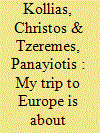| Srl | Item |
| 1 |
ID:
186198


|
|
|
|
|
| Summary/Abstract |
The European Defence Technological and Industrial Base (EDTIB) is considered as a key element in the quest for a European Security and Defence Union. The EDTIB strategy initiated in 2007 aimed to lead to greater integration of the fragmented national defence industries of EU member-states, achieve economies through the coordination of defence industrial policy, the pooling of resources in the production and acquisition of weapons systems and better serve the political objectives of European defence. The paper examines the extent to which EU27 member-states satisfy their demand for arms through the procurement of EDTIB origin defence inputs. Moreover, it explores whether a process of convergence is present in terms of the share of EDTIB origin imports in the total arms imports of the EU member-states. The presence or not of a convergence process is examined empirically using β- and club convergence methodologies. In broad terms, the findings point to a process of convergence albeit at different speeds, as indicated by the club-convergence analysis.
|
|
|
|
|
|
|
|
|
|
|
|
|
|
|
|
| 2 |
ID:
190849


|
|
|
|
|
| Summary/Abstract |
Using President Joe Biden’s opinion article published in The Washington Post ahead of the June 14, 2021 NATO Summit as a point of departure, the present paper examines how NATO members fare in terms of the core constituent elements of liberal democracy such as civil liberties and freedom of expression. To this effect, the paper uses three indices constructed and published by the Varieties of Democracy project. The Liberal democracy, Civil liberties and Freedom of expression indices. The results from club convergence analysis that covers the post-Cold War period, indicate the presence of different convergence clubs among NATO’s member-states and Turkey as the single divergent country. Moreover, given that many NATO countries are also EU members, the paper examines the comparative effect the dual NATO and EU membership had on the democratisation process of East European countries and Turkey. The findings suggest a statistically stronger impact of EU membership vis-à-vis NATO membership.
|
|
|
|
|
|
|
|
|
|
|
|
|
|
|
|